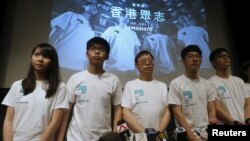Several of Hong Kong’s young political activists are calling for independence from China and changes to the city’s Basic Law, which calls the territory an inalienable part of China.
But it is not clear if the calls for independence will gain any traction outside a small group of supporters.
Activists such as Chan Ho-Tin say they are forming a plan to push for independence, and that plan may include violence against the state. Earlier this year, Chan, 25, who said he was largely apolitical before joining the 2014 pro-democracy protests in Hong Kong, founded the Hong Kong National Party.
Concerned by what he views as Beijing’s encroaching influence on Hong Kong, Chan said his party will use any means necessary, including violence, to fight for independence of the city. Chan says he is working with other pro-independence groups in the city, and that his party will field candidates in elections for the Legislative Council in September.
Another pro-democracy activist, Joshua Wong, said his recently founded party, Demosisto, would leave any decision on independence to the Hong Kong people. He added that he will push for a referendum on the issue.
Many people do not give the cause much chance of gaining traction, while others are openly dismissive of the idea.
Joseph Cheng, a democracy activist and professor emeritus at the City University of Hong Kong, said the calls for Hong Kong’s independence should be seen as a refutation of the city’s leadership.
“The small group which openly advocates for independence has no concrete program nor action plan to realize Hong Kong independence. It is largely a gesture of defiance, a gesture of denial of the legitimacy of the Hong Kong government,” he said.
Perilous possibility
Regina Ip, chair of the pro-Beijing New People’s Party, says Hong Kong’s inextricable economic and political ties to China make the recent calls for independence a dangerous option.
“It’s very bad news, because separatism from China, or secession from China, is clearly a nonstarter. We have always been a part of China. We rely on China for food and water, for the bulk of our trade; 70 percent of our publicly ministered companies on the Hang Seng stock market index are from mainland China. China is our largest trading and investment partner. [Secession would] be an unmitigated economic disaster for Hong Kong,” she said.
Pan-democrat lawmakers, who support more democracy, have also widely dismissed calls for independence as unrealistic and unnecessary. Several young pan-democrat lawmakers are pushing for an extension of Hong Kong’s autonomy beyond 2047, when the “one country, two systems” formula expires.
Emily Lau, head of Hong Kong’s Democratic Party, said activists’ push for full independence of the city would not have wide support in the city. “I think they are free to promote what they want, to speak what they want, but I think that most people in Hong Kong do not support it,” she said.
While pan-democratic lawmakers have discounted recent calls for independence as unlikely to be realized, pro-Beijing representatives have reacted strongly, saying any push for independence could result in jail time.
A director in the law department of China’s representative office in Hong Kong said that anti-sedition laws currently on the books in Hong Kong could be used to arrest activists who advocate political independence from China.
